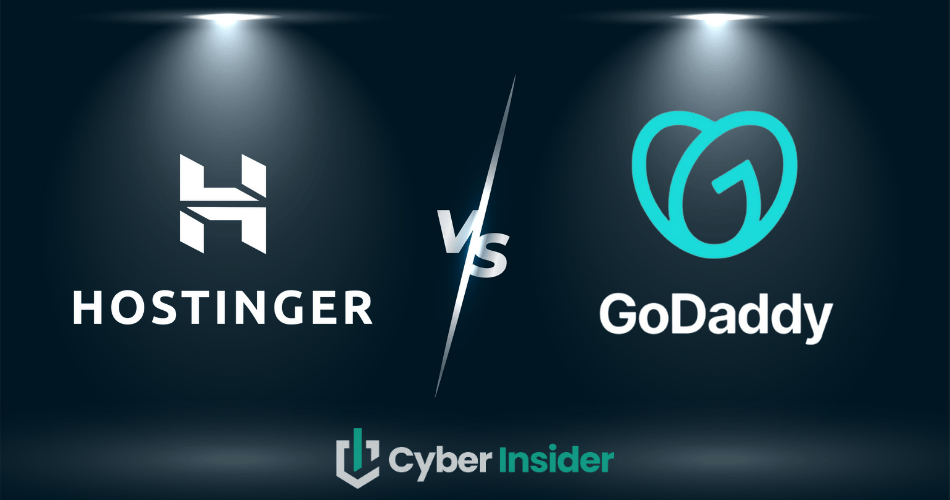
Hostinger or GoDaddy? It’s like picking between two seasoned travel guides for your web-hosting adventure. Both can lead the way, but who knows the shortcuts you need?
In today’s online-first world, a reliable web hosting provider isn’t just a luxury – it’s the backbone of your website’s success. So, picking the right host can make all the difference, influencing everything from your site’s speed and performance to its security and overall user experience.
In this guide, we’ll break down Hostinger vs GoDaddy to help you find your perfect match. From performance and pricing to ease of use and support, we’ll cover it all. Hostinger shines with budget-friendly plans and beginner tools, while GoDaddy brings industry experience and a wide range of services, including domains and marketing.
Why trust us? We dive deep into the details, testing and researching to give you honest insights. Whether you’re starting fresh or upgrading, we’re here to make your choice easier. Now, let’s see if Hostinger or GoDaddy is your perfect match.
Quick overview
| Hostinger | GoDaddy | |
| Website | Hostinger.com | GoDaddy.com |
| Hosting types | Shared, VPS, cloud, Minecraft server, WordPress, WooCommerce, and email hosting | Shared, WordPress, WooCommerce, and VPS hosting |
| Pricing | $2.95 – $29.99/month | $4.99 – $339.99/month |
| Money-back guarantee | 30 days (with all plans) | 30 days (with shared hosting plans) |
| Uptime guarantee | 99.9% | 99.9% |
| Server locations | The US, the UK, Brazil, Indonesia, India, Lithuania, the Netherlands, and Singapore | The US, the Netherlands, and Singapore |
| 24/7 customer support | Yes | Yes |
| Best deal | 79% off coupon > |
Highlight from our Hostinger and GoDaddy comparison
Hostinger offers lower starting and renewal prices compared to GoDaddy, making it more appealing for budget-conscious users.
Hostinger excels in performance with faster loading speeds and superior uptime guarantees compared to GoDaddy.
Both providers offer 24/7 customer support, but Hostinger’s service is generally rated higher for responsiveness and quality.
Looking for the best deals? Check out our exclusive Hostinger pricing and GoDaddy pricing to save big.
Overview of Hostinger and GoDaddy
With Hostinger’s unbeatable prices and GoDaddy’s robust offerings, each has its strengths. Let’s take a quick look at what these hosting heavyweights bring to the table.
Hostinger overview
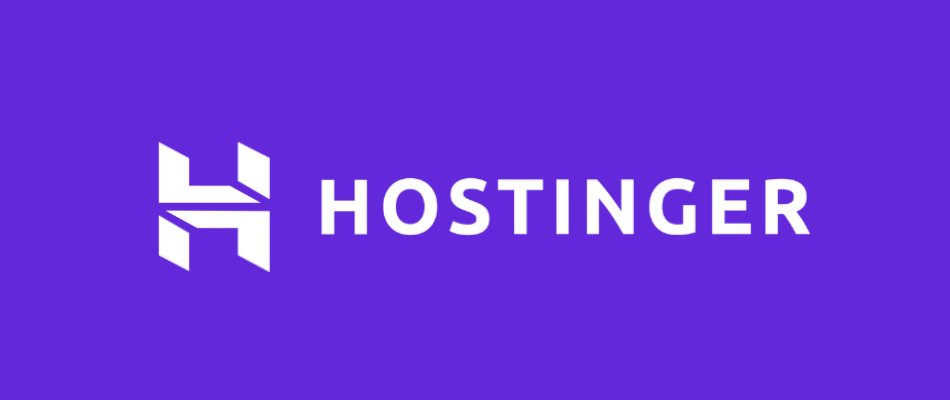
Hostinger’s story began in 2004 in Lithuania as a small tech startup, but today, it’s a global hosting powerhouse trusted by over 3 million customers across 150+ countries. What makes Hostinger stand out? It's a blend of affordability, speed, and user-friendly features, making it a top pick for both beginners and small businesses looking to boost their online presence.
At the heart of Hostinger’s ease of use is its hPanel. This custom control panel is so simple to navigate – whether you’re a web hosting rookie or a seasoned expert. Hostinger makes it easy to handle everything from domains to hosting settings – no stress, no confusion. And with a 99.9% uptime guarantee, your site will stay fast and dependable for visitors around the globe.
At Hostinger, speed is a priority, thanks to their LiteSpeed web servers, which keep your site loading smoothly – even during traffic surges. With unlimited bandwidth on most plans, there’s no risk of hitting any limits. And for peace of mind, Hostinger offers robust security features like free SSL certificates, DDoS protection, malware scanning, and a web application firewall.
But the perks don’t stop there. All Hostinger plans come with fast SSD storage for improved site performance, and automatic weekly backups mean your data is always protected. If you're ready to create a website, Hostinger’s AI-powered website builder makes it incredibly easy to build a polished, professional site – no coding required. And when you sign up for a long-term plan, you’ll even get a free domain for the first year.
Hostinger stands out with its winning mix of performance, simplicity, and excellent customer support, making it a go-to choice for anyone seeking reliable and affordable hosting.
+ Pros
- Beginner-friendly site builder across all plans
- Budget-friendly pricing
- AI-powered troubleshooter for WordPress sites
- Free domain for one year
- Free business email included
- Free automatic site migration
- Unlimited free SSL certificates
- User-friendly control panel called hPanel
- Servers across four continents and nine countries
- Free weekly and daily backups
- LiteSpeed servers with built-in cache engine for lightning-fast performance
- Large discounts for long-term plans
- 30-day money-back guarantee
- 99.9% uptime guarantee
– Cons
- hPanel can be slow at times
- No dedicated or unmanaged hosting
- No phone support
- Email accounts share limited storage space
- Higher renewal rates
Now, it’s time to put GoDaddy in the spotlight and see how it compares.
GoDaddy overview
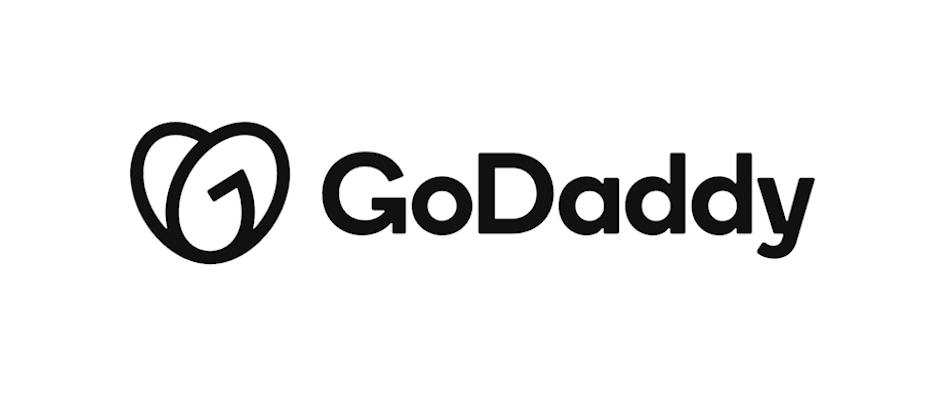
Since its start in 1997 in sunny Arizona, GoDaddy has grown into a web hosting giant, with over 21 million customers counting on its services worldwide. With plans ranging from shared hosting to VPS and dedicated servers, GoDaddy ensures you’ll find the right fit for every step of your online journey.
One of GoDaddy’s best tricks is its one-click app installer, Installatron. Setting up WordPress or hundreds of other apps is so effortless you’ll feel like a tech guru in no time. To sweeten the pot, most plans include a free domain for the first year and a professional email account – just keep in mind the email is complimentary for year one only.
GoDaddy takes security seriously, too. Automatic backups and malware scanning come standard with shared and WordPress plans, keeping those pesky digital threats at bay. If you’re more hands-on, the GoDaddy website builder lets you make real-time edits, and upgrading allows you to connect your domain for a polished, professional finish.
Performance is another big win here. With data centers strategically placed in North America, Europe, and Asia-Pacific, GoDaddy guarantees speedy load times for visitors across the globe. Add in 37,000+ servers and a 99.9% uptime guarantee, and you’ve got a hosting provider you can count on.
Got questions at 2 AM or during a mid-morning caffeine rush? No worries – GoDaddy’s around-the-clock customer support via phone and text has your back. Still unsure? Their 30-day money-back guarantee lets you try it all without breaking a sweat.
With beginner-friendly tools, robust performance, and flexible plans, GoDaddy makes web hosting simple and stress-free.
+ Pros
- Beginner-friendly interface
- Extensive customer support options
- Competitive initial pricing
- Free domain for the first year
- Free SSL certificate
- Choice of global server locations
- Fast setup time
- 30-day money-back guarantee
- 99.9% uptime guarantee
– Cons
High renewal rates
Terrible upselling tactics
Limited SSL on cheaper plans
Subpar customer support
No cloud or dedicated server hosting
Now, let’s dive into the plans and see how these competitors stack up against each other.
Pricing and plans: Which offers better value – Hostinger or GoDaddy?
Pricing is a key factor when picking a hosting service. Hostinger and GoDaddy roll out web hosting plans designed to fit various needs and wallets.
| Hosting type | Hostinger | GoDaddy |
| Shared hosting | ✔️ | ✔️ |
| WordPress hosting | ✔️ | ✔️ |
| WooCommerce hosting | ✔️ | ✔️ |
| Cloud hosting | ✔️ | ❌ |
| VPS hosting | ✔️ | ✔️ |
| Game server hosting | ✔️ | ❌ |
| Reseller hosting | ❌ | ✔️ |
| Dedicated server hosting | ❌ | ❌ |
Who takes the crown for the best deal? Let’s take a closer look at what each host brings to the table. From pricing details to included features and value for money, we’ll uncover the hosting provider that’s right for you.
Hostinger pricing
| Type of hosting | Starting price |
| Shared hosting | $1.95/month |
| WordPress hosting | $1.95/month |
| WooCommerce hosting | $2.95/month |
| Cloud hosting | $7.59/month |
| VPS hosting | $4.99/month |
| Minecraft server hosting | $5.99/month |
Hostinger has earned a reputation as one of the most budget-friendly web hosting providers out there, and it’s easy to see why. Whether you’re just starting your online journey or planning to grow big, Hostinger has a plan that fits your goals – and your wallet.
Looking for an affordable way to get your site up and running? Hostinger’s shared hosting plans start at just $1.95/month and include everything you need to get started: a free SSL certificate, 100GB of bandwidth, and impressively fast loading speeds. It’s a great pick for personal blogs, portfolios, or small websites – simple, affordable, and reliable.
If your website outgrows the basics, Hostinger’s VPS hosting is here to save the day. Starting at $3.99/month, you get dedicated resources and full root access, giving you more power and control. It's perfect for handling extra traffic and keeping things running smoothly.
For those with big plans, Hostinger’s “Cloud Startup” plan at $9.99/month offers some serious firepower. With 200GB of SSD storage, 3GB of RAM, and a free domain, this plan is built for growth. Plus, you don’t have to stress about managing servers – it’s all taken care of. It’s like giving your site a business-class upgrade.
Love WordPress? Hostinger’s WP Starter tool makes creating your website super simple with one-click installers and automatic updates. Running an online store? Hostinger’s managed WooCommerce hosting gives you a secure platform, plus extras like a free domain and SSL certificate to keep your customers’ data safe.
Hostinger even accepts Bitcoin for payments, which is pretty rare in the hosting world. Add to that their 30-day money-back guarantee, and you’ve got plenty of room to try things out risk-free.
Wondering how GoDaddy measures up? Let’s dive into their pricing and features to find out.
GoDaddy pricing
| Type of hosting | Starting price |
| Shared hosting | $4.99/month |
| WordPress hosting | $8.99/month |
| WooCommerce hosting | $20.99/month |
| VPS hosting | $8.99/month |
| Reseller hosting | $107.88/year |
GoDaddy is a well-known name in hosting, offering pricing plans that cater to small startups, creators, and everything in between.
Their shared hosting starts at $4.99 per month, making it an easy entry point for beginners. The “Web Hosting Starter” plan provides 10GB of NVMe storage, one database, and shared resources. While it’s perfect for basic needs, it’s not suited for multiple websites or high-end features.
For WordPress enthusiasts, GoDaddy’s “Managed WordPress Basic” plan at $15.99 per month adds extra perks, like 10GB of storage, weekly backups, and AI optimization tools. It’s a great fit for smaller sites, and you even get a free domain and SSL for the first year. The tradeoff? It only supports one website and lacks advanced features like a CDN or top-tier security, which could be a problem as your site grows.
As your site expands, GoDaddy’s VPS hosting offers a step up, starting at $8.99 per month. The VPS 1 plan gives you 1 vCPU core, 2GB RAM, and 40GB of NVMe SSD storage, offering dedicated resources for handling more traffic. However, GoDaddy has retired its dedicated server plans, so those seeking full control and advanced virtualization may find the VPS plan limiting.
For aspiring hosting entrepreneurs, GoDaddy’s reseller hosting, starting at $107.88 per year, lets you sell hosting under your brand while GoDaddy handles the backend. You can set pricing, manage accounts, and track commissions from a centralized dashboard, though the limited customization options and yearly cost mean it’s best suited for those with proven demand.
However, GoDaddy’s pricing can be tricky. First-year perks like free domains and SSL certificates come with renewal fees, and their checkout process often includes upsells like email hosting and backups that inflate your bill. For website security, their plans start at $12.99 per month, offering basic protection like daily scans and firewalls, but these services auto-renew at full price, adding to the long-term cost.
So, is Hostinger or GoDaddy the better deal?
With starting prices as low as $1.95 per month, Hostinger offers essential features like a free SSL certificate and generous bandwidth, making it a solid pick for small websites. GoDaddy, on the other hand, starts at a higher price and includes additional renewal fees, plus it doesn’t offer cloud hosting—something crucial for businesses looking for scalability and redundancy.
Hostinger steps it up with VPS hosting and cloud resources, giving you more flexibility as your site grows. Both providers include free domain names and SSL certificates, but Hostinger’s budget-friendly approach, paired with its feature-packed plans, is hard to beat for cost-conscious users.
Ease of use: Is Hostinger or GoDaddy more user-friendly?
For beginners, Hostinger is an easy win thanks to its user-friendly hPanel, which simplifies the entire hosting experience. GoDaddy, while a bit more complex with its use of cPanel, compensates with a robust set of features that give more control to advanced users willing to put in the time to learn.
First steps: Signing up and connecting a domain
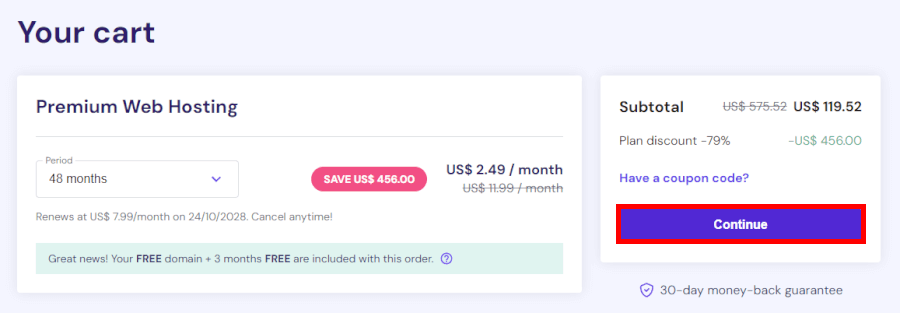
Starting with Hostinger is refreshingly simple. After picking a hosting plan, you can choose a subscription duration, with longer terms offering better deals. Creating an account is quick, with options to sign up via email, Google, or Facebook. Hostinger also impresses with payment flexibility, accepting credit cards and even Bitcoin. Claiming a free domain on annual plans is simple – search for availability, or connect an existing domain by updating name servers or A records. DNS updates can take up to 24 hours, but the process is clearly explained, making setup straightforward even for beginners.

GoDaddy offers a slightly more involved experience. Buying a domain with GoDaddy ensures a smooth connection to your hosting, but bringing your own domain requires extra steps, like navigating DNS settings or updating name servers. While the process itself is clear, syncing changes can take up to 48 hours. GoDaddy’s platform is feature-rich but occasionally lacks the beginner-friendly touch, and support can sometimes fall short when more detailed help is needed.
User dashboard: Taking control of your site
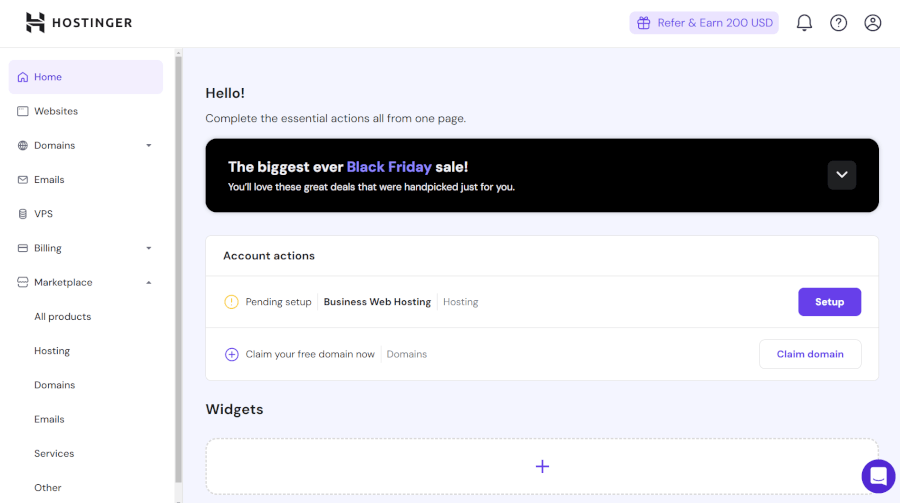
When it comes to managing your website, Hostinger shakes things up with its custom-built hPanel. Unlike the traditional cPanel, hPanel is sleek, intuitive, and designed to keep things simple. Whether you’re setting up HTTPS, restoring backups, or tweaking performance settings, the interface feels tailored for both beginners and experienced users. It’s packed with handy tools like analytics and plugin vulnerability checks, making site management a breeze. Occasionally, there’s a slight lag, but regular updates ensure hPanel stays fresh and user-friendly.
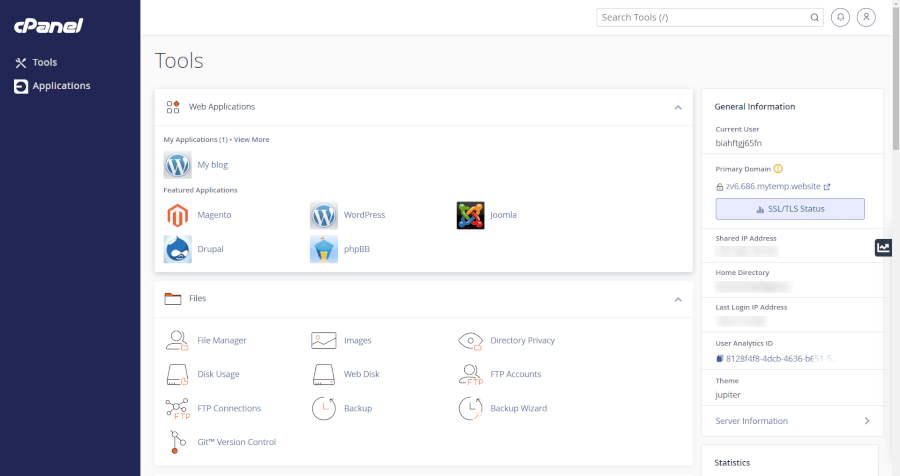
GoDaddy, meanwhile, sticks to the familiar cPanel for most plans, offering a solid, no-nonsense experience. Tasks like managing domains, databases, or email accounts are straightforward, but getting to the main account dashboard involves an extra click, which feels a bit clunky. For VPS hosting, you can opt for either cPanel or Plesk.
Both dashboards make it easy to install apps like WordPress with just one click, and domain-linked email accounts are available too – though GoDaddy only offers free email for the first year.
In the end, if you’re all about a modern, streamlined experience, Hostinger’s hPanel is the clear winner. On the flip side, if you like sticking with the tried-and-true, GoDaddy’s dependable cPanel won’t let you down, even if it feels a tad old-school.
Building your website: Which one makes it easier?

Hostinger‘s AI-powered site builder offers a drag-and-drop interface that’s both beginner-friendly and versatile. With over 150 sleek templates and a 30-day free trial, you can whip up a professional-looking site in under a minute – just enter your brand name and type, and you’re off. If WordPress is more your speed, Hostinger’s setup process walks you through everything, even suggesting plugins tailored to your site type. The only hiccup? Its custom backend can be a bit busy, but it still gets the job done.

GoDaddy takes simplicity to heart with its site builder. Designed for absolute beginners, it lets you drag, drop, and rearrange your site with ease while previewing changes in real time. Need a head start? GoDaddy’s ADI tool can whip up a fully functional website in just a few clicks. While customization options are somewhat limited, features like built-in SEO tools, Google Analytics, and email marketing make up for it, ensuring your site doesn’t just exist – it thrives.
If you’re after creative freedom and depth, Hostinger has your back. But if you want to get online fast without breaking a sweat, GoDaddy’s polished approach might just be your perfect match.
Website migration: Making the move with ease
Moving to a new host can be overwhelming, but Hostinger and GoDaddy keep it smooth and simple.
Hostinger takes the hassle out of the process with its free, fully managed migration service. Just fill out a simple form with your site’s URL and login details, and their team handles the rest. It’s like handing over your moving boxes and coming back to find everything neatly unpacked and in place. Better yet, they ensure your site stays live during the move, so there’s no “closed for maintenance” sign to worry about.
GoDaddy, meanwhile, lets you take the wheel with its user-friendly migration tool. Whether you’re moving a WordPress site or something else, the process is efficient and beginner-friendly. New users get a guided setup during sign-up, while existing customers can kick things off from their dashboard. Not feeling DIY? GoDaddy also offers managed migration services, but you might need to budget extra for the concierge treatment.
Which host is more user-friendly, Hostinger or GoDaddy?
Hostinger shines with its modern hPanel, perfect for beginners, while GoDaddy sticks to the classic but less intuitive cPanel. Hostinger’s site builder offers creative options, while GoDaddy’s tool is all about speed.
Performance and reliability: Which host provides better reliability and performance?
Performance and reliability can make or break your website’s success. So, let’s take a closer look at how Hostinger and GoDaddy perform under pressure to see which one delivers the most reliable service.
Server locations
Hostinger takes a more international approach, with servers spread across eight countries, from the US and UK to Brazil, Indonesia, and India. This range gives you more options for targeting diverse markets, especially in growing regions like Southeast Asia and South America.
GoDaddy, on the other hand, leans heavily on its strong US presence, with multiple server locations across cities like Phoenix, Los Angeles, and Chicago. While its European and Asian coverage (in Amsterdam and Singapore) is solid, it’s clear GoDaddy’s primary strength lies in the US.
So, if you're aiming for a truly global reach, Hostinger’s wider spread might give you a bit more flexibility. But if your audience is primarily in the US, GoDaddy’s robust network there could be the better choice.
Website loading speed
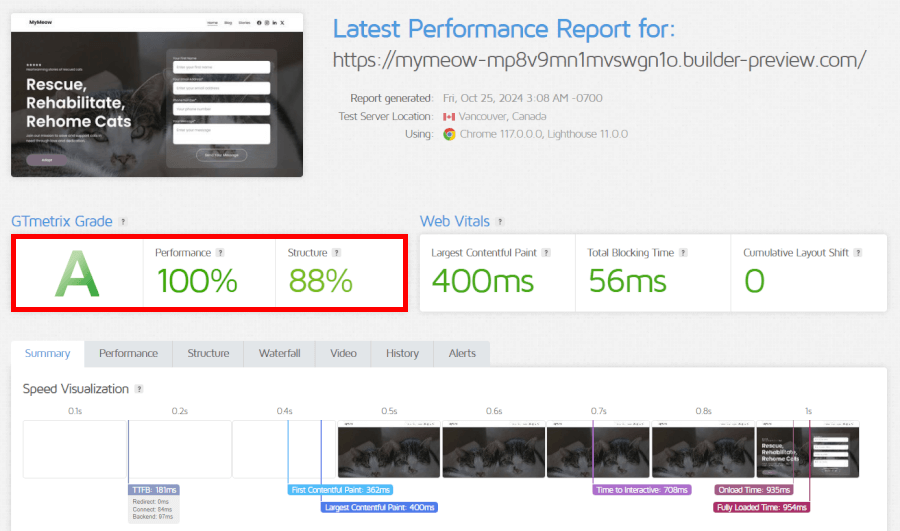
We tested both hosts using GTmetrix, and Hostinger wowed us with a jaw-dropping 100% score and a blazing 954-millisecond load time – way faster than the average 2.5 seconds most sites take to load. This speed is thanks to Hostinger’s solid tech infrastructure, like its use of SSDs that keep things running smooth and quick.
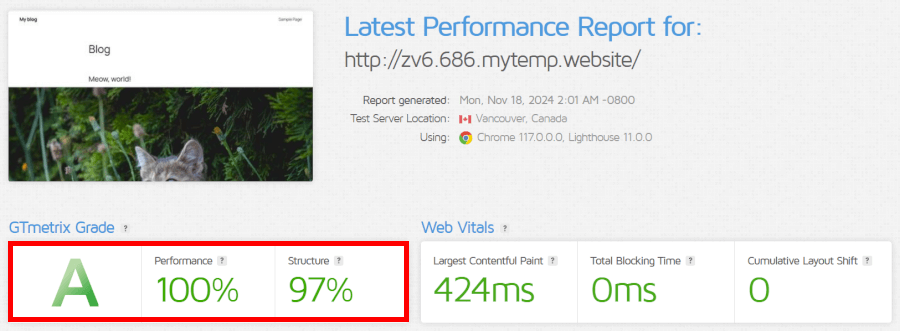
GoDaddy also impressed with a perfect 100% score on GTmetrix, offering speedy performance with solid infrastructure and CDN support. But even with its strong setup, Hostinger still manages to edge ahead, providing an extra boost in load time.
Uptime and response time
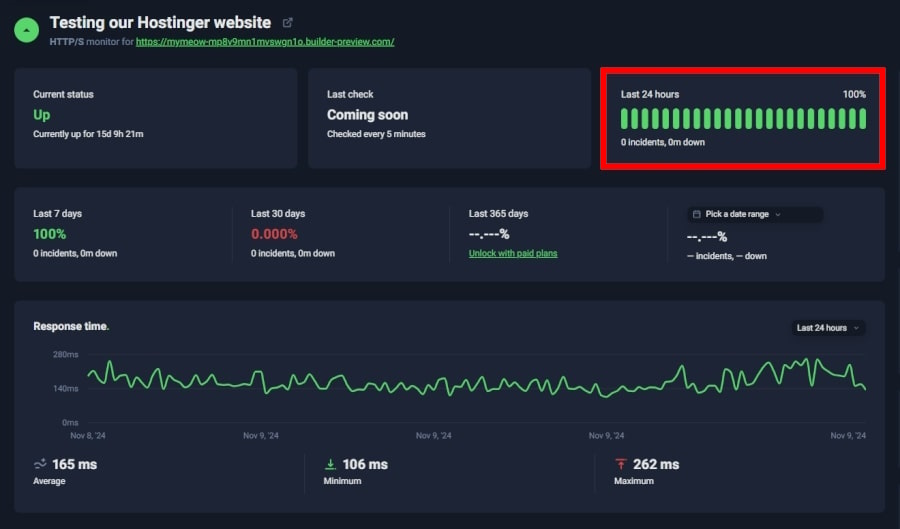
Hostinger leans on its cutting-edge tech, like LiteSpeed servers, NVMe SSDs, and Cloudflare CDN support, to deliver fast, stable performance. They’re so confident in their 99.9% uptime guarantee that they’ll credit you 5% of your monthly fee if they fall short. Response times are snappy, though users far from their server locations, like in Australia, might notice a tiny lag when using US servers.
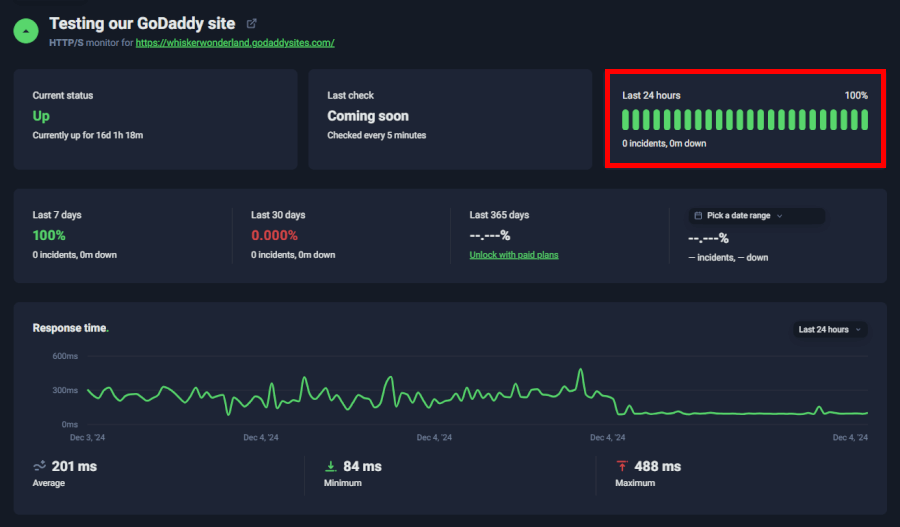
GoDaddy matches the 99.9% uptime promise and also offers a 5% credit for downtime, with a catch – the guarantee doesn’t cover scheduled maintenance or outages caused by external factors. Thanks to SSD storage and CDN integration, GoDaddy provides solid performance, but response times can depend more on server location and site configuration.
Hostinger or GoDaddy – Who’s got the edge?
When it comes to performance, Hostinger takes the crown with its blazing-fast speeds and reliable uptime. While GoDaddy offers a solid range of services and extensive support, Hostinger’s superior performance and affordability make it the clear choice for those prioritizing speed and reliability in their hosting provider.
Security features: Who protects your site better?
When it comes to protecting your site, Hostinger doesn’t cut corners. Every plan includes unlimited free SSL certificates, regular backups, multi-layered DDoS protection, and malware scanning. Plus, their proactive approach, including advanced traffic filtering and round-the-clock monitoring, means fewer worries for you.
GoDaddy plays it safe too, with basics like DDoS protection, firewalls, and daily backups. However, their best security features often hide behind a paywall. SSL certificates are free only for the first year, and more advanced protections, like malware scanning and removal, require add-ons or upgrades.
For those who want top-notch security baked into their hosting plan from day one, Hostinger’s all-inclusive approach feels like a warm security blanket – no hidden fees, no surprises.
Customer support: Which host delivers the best support?
When your site goes off track, having reliable support at your fingertips is a must. Let’s compare how GoDaddy and Hostinger respond when you need them.
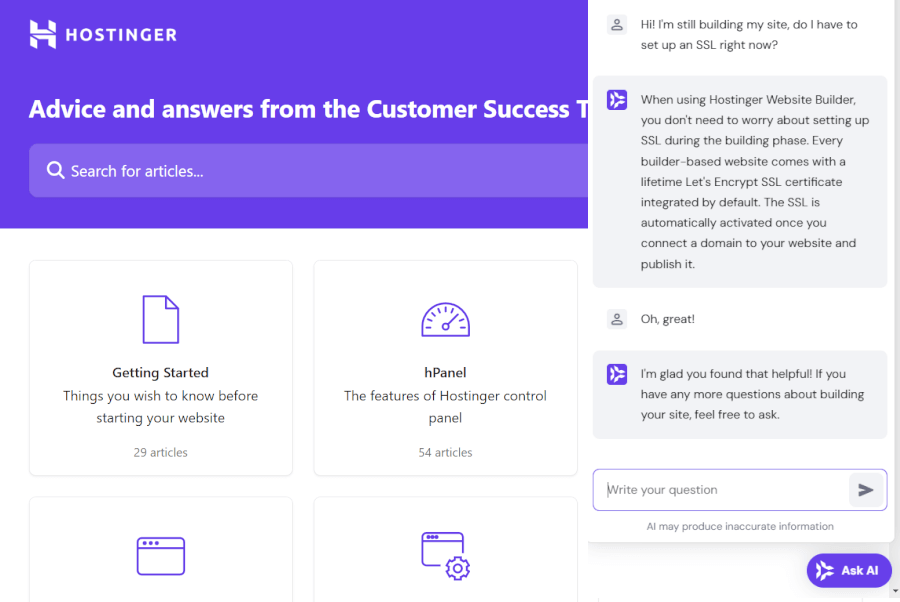
Hostinger doesn’t offer phone support, but they make up for it with lightning-fast 24/7 live chat. You’ll often find yourself chatting with a friendly rep who’s ready to solve your problem in minutes. For quick answers to simple questions, their AI-powered assistant, Kodee, is pretty handy too. While Hostinger’s customer support is now more guide-driven (they point you to tutorials and troubleshooting steps), this approach helps you get the answers you need on your own, without unnecessary back-and-forth. It’s a more independent way of solving problems, but it works, and it’s efficient.
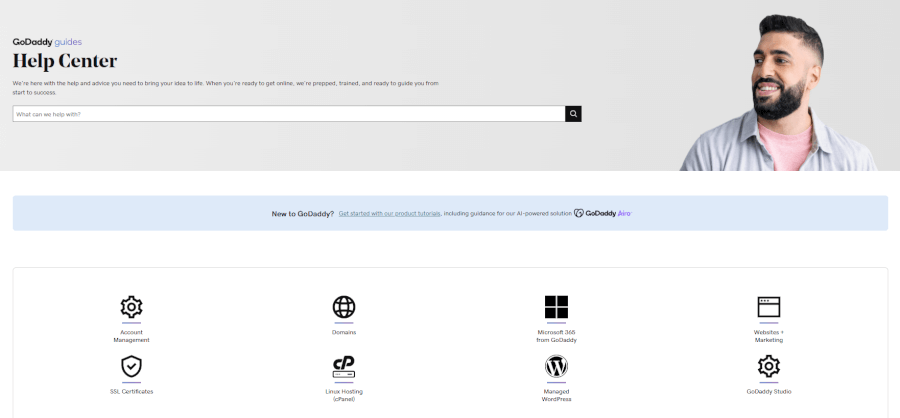
Now, GoDaddy offers 24/7 phone and live chat support, which sounds great, right? The catch is, getting through to someone on live chat can feel like waiting for a kettle to boil. Once you do connect, response times can drag, and sometimes the help you get isn’t as sharp as you’d hope. But hey, their extensive knowledge base and video tutorials are a solid starting point for those who prefer to tackle things on their own. And if you’re in a jam, you can always turn to their phone support. Just be prepared for varying response quality, and remember, patience is key.
Hostinger vs GoDaddy: Which host wins?
The right hosting can take your site to the next level. Let’s see how Hostinger and GoDaddy measure up in the ultimate web hosting match-up:
Pricing and plans: Hostinger – Hostinger's competitive pricing and feature-rich plans offer great value, especially for budget-conscious users, with low starting prices and essential features included.
Ease of use: Hostinger – With its intuitive hPanel and beginner-friendly tools, Hostinger offers a more streamlined and accessible experience for users, whether they're new to hosting or seasoned pros.
Performance and reliability: Hostinger – It leads with its fast loading speeds and reliable uptime, making it ideal for users who prioritize performance and dependability.
Security features: Hostinger – Hostinger provides comprehensive security, including free SSL certificates, DDoS protection, and malware scanning, without hidden fees, ensuring robust site protection.
Customer support: Tie – Hostinger excels with quick and efficient 24/7 live chat support, while GoDaddy offers extensive support options, including phone assistance, though with varying response quality.
While both Hostinger and GoDaddy deliver solid web hosting services, Hostinger's superior performance, user-friendly interface, and cost-effective plans make it a standout choice for those seeking reliable and affordable hosting solutions.
Hostinger vs GoDaddy FAQs
Which hosting provider is more budget-friendly?
Hostinger is the more budget-friendly option. With starting prices as low as $1.95 per month, Hostinger offers essential features like a free SSL certificate and generous bandwidth, making it a great choice for cost-conscious users.
Which host is faster, Hostinger or GoDaddy?
Hostinger takes the lead in speed. With a jaw-dropping 100% score on GTmetrix and a blazing 954-millisecond load time, Hostinger's fast performance is hard to beat, thanks to their solid tech infrastructure and SSDs.
Do Hostinger and GoDaddy provide phone support?
Hostinger doesn't offer phone support but excels with fast 24/7 live chat assistance. GoDaddy, however, provides 24/7 phone support, though the response quality can vary. Both hosts keep support close at hand.
Do I get a money-back guarantee with Hostinger and GoDaddy?
Yes, both Hostinger and GoDaddy offer a 30-day money-back guarantee. This allows you to try their services risk-free and see if they meet your hosting needs.
This Hostinger vs GoDaddy comparison guide was last updated on December 7, 2024.

Leave a Reply